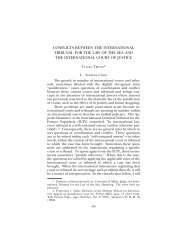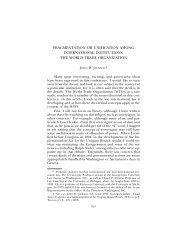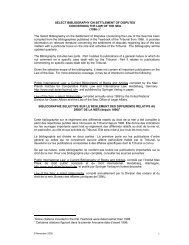some concluding remarks - Project on International Courts and ...
some concluding remarks - Project on International Courts and ...
some concluding remarks - Project on International Courts and ...
You also want an ePaper? Increase the reach of your titles
YUMPU automatically turns print PDFs into web optimized ePapers that Google loves.
932 INTERNATIONAL LAW AND POLITICS [Vol. 31:919Ghali made a desperate effort to raise 5,000 troops tostrengthen the peacekeeping force there. But nobody—East,West, North, or South—was willing to commit any troops inthose circumstances. Preventi<strong>on</strong> was c<strong>on</strong>sidered, but therewas no political will for it. Does this mean that, after the tragedy,nothing should have been attempted or d<strong>on</strong>e?It is likewise true that the “natural judge” in criminal mattersis the territorial judge, because he is the nearest to thefacts <strong>and</strong> the best able to rec<strong>on</strong>stitute what happened <strong>and</strong> tounderst<strong>and</strong> the mentality <strong>and</strong> motivati<strong>on</strong> of the local peopleinvolved. But this natural judge is not always available or credible.This is why it is of crucial importance to devise a goodworking relati<strong>on</strong>ship between internati<strong>on</strong>al tribunals, as a lastresort against impunity, <strong>and</strong> internal courts <strong>and</strong> tribunals thatc<strong>on</strong>tinue to play the role of the “natural judge” in normal circumstances.Indeed, neither in terms of resources nor interms of proximity <strong>and</strong> access to relevant pers<strong>on</strong>s, evidence,<strong>and</strong> events does criminal justice provide an optimal soluti<strong>on</strong>.It is a sec<strong>on</strong>d best. But in certain circumstances, the best is notavailable, or not credible. In these circumstances, a less perfectmachinery of justice is better than no justice at all.Whatever the criticisms that can be addressed to the Internati<strong>on</strong>alCriminal Tribunals, it is clear that their establishmenthas thrust the issue of internati<strong>on</strong>al criminal justice from therealm of theoretical speculati<strong>on</strong> into that of practical politics.This shift in itself is a breakthrough in the development of internati<strong>on</strong>allaw. This is not to menti<strong>on</strong> the potentially majorc<strong>on</strong>tributi<strong>on</strong> of internati<strong>on</strong>al criminal tribunals in the l<strong>on</strong>grun—of integrating, through their jurisprudence, the disjointed<strong>and</strong> overlapping c<strong>on</strong>cepts we inherited from Nuremberg<strong>and</strong> Tokyo into a coherent normative system of internati<strong>on</strong>alcriminal law. 9In the face of all the practical problems raised by tragicevents, if <str<strong>on</strong>g>some</str<strong>on</strong>g>thing can be d<strong>on</strong>e about them, however partial<strong>and</strong> imperfect a resp<strong>on</strong>se this may be, I do not c<strong>on</strong>sider thatthe best course of acti<strong>on</strong> is to say that unless this resp<strong>on</strong>se isperfect in every way, it should not be tried at all (assuming thatwe can know beforeh<strong>and</strong> what the perfect resp<strong>on</strong>se is). Weshould first try what is feasible, then try to improve <strong>on</strong> that, in9. I have discussed this aspect in my separate opini<strong>on</strong> in the Tadic Case.See Prosecutor v. Tadic, supra note 6 (separate opini<strong>on</strong> of Judge Abi-Saab).






